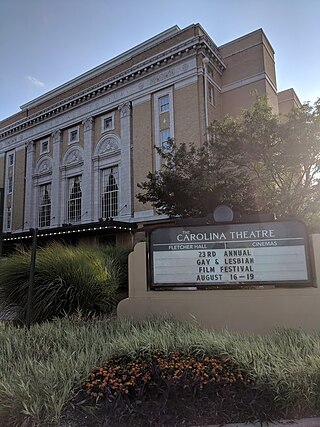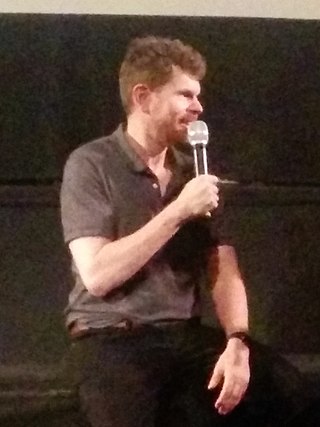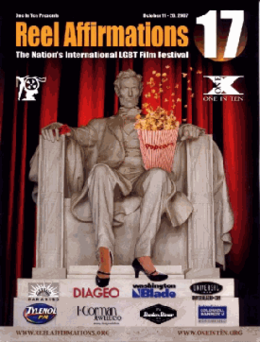NewFest: The New York Lesbian, Gay, Bisexual, & Transgender Film Festival put on by The New Festival, Inc., is one of the most comprehensive forums of national and international LGBT film/video in the world.

The Inside Out Film and Video Festival, also known as the Inside Out LGBT or LGBTQ Film Festival, is an annual Canadian film festival, which presents a program of LGBT-related film. The festival is staged in both Toronto and Ottawa. Founded in 1991, the festival is now the largest of its kind in Canada. Deadline dubbed it "Canada’s foremost LGBTQ film festival."
QFest, formerly known as the Houston Gay & Lesbian Film Festival (HGLFF), is a nonprofit organization based in Houston, Texas, dedicated to promoting the media arts as a tool for communication and cooperation among diverse communities by presenting films, videos, and programs by, about, or of interest to the LGBTQ community.

The North Carolina Gay & Lesbian Festival is an annual LGBT film festival produced by the Carolina Theater in Durham, North Carolina, typically held in mid-August. The festival has been credited in previous years as the second largest LGBT film/video festival in the Southeastern United States.
Outfest is an LGBTQ-oriented nonprofit that produces two film festivals, operates a movie streaming platform, and runs educational services for filmmakers in Los Angeles. Outfest is one of the key partners, alongside the Frameline Film Festival, the New York Lesbian, Gay, Bisexual, & Transgender Film Festival, and the Inside Out Film and Video Festival, in launching the North American Queer Festival Alliance, an initiative to further publicize and promote LGBT film.

The Frameline Film Festival began as a storefront event in 1976. The first film festival, named the Gay Film Festival of Super-8 Films, was held in 1977. The festival is organized by Frameline, a nonprofit media arts organization whose mission statement is "to change the world through the power of queer cinema". It is the oldest LGBTQ+ film festival in the world.
One In Ten (OIT) is a non-profit, all-volunteer LGBTQ arts organization in Washington, D.C. Its largest program is Reel Affirmations, the third largest LGBT film festival in the United States and the largest all-volunteer film festival in the world.

The Atlanta Film Festival (ATLFF) is an international film festival held in Atlanta, Georgia and operated by the Atlanta Film Society, a 501(c)(3) nonprofit organization. Started in 1976 and occurring every spring, the festival shows a diverse range of independent films, with special attention paid to women-directed films, LGBTQ films, Latin American films, Black films and films from the American Southeast. ATLFF is one of only a handful of festivals that are Academy Award-qualifying in all three short film categories.

"Side by Side" Lesbian and Gay International Film Festival is an international film festival that seeks to explore the issues of homosexuality, bisexuality and transgender (LGBT) through art cinema. Since 2008 it has taken place every autumn in Saint Petersburg, Russia. In addition, various special events are held almost every month, and since 2009 film showings and discussions have also been conducted in other parts of Russia.

Edie & Thea: A Very Long Engagement is a 2009 American documentary film directed and produced by Susan Muska and Gréta Ólafsdóttir for their company Bless Bless Productions, in association with Sundance Channel. The film tells the story of the long-term lesbian relationship between Edie Windsor and Thea Spyer, including their respective childhoods, their meeting in 1963, their lives and careers in New York City, Thea's diagnosis with multiple sclerosis and Edie's care for her partner, and their wedding in Toronto, Canada, in May 2007, because gay marriage was not then legal in their home state of New York.
Julie Casper Roth, is an American artist, documentary filmmaker, experimental video artist, and writer based in Connecticut.

Stu Maddux is American freelance writer, editor, and cinematographer. He is a movie producer and director of his own non-fiction independent films. He is best known for his work Gen Silent, a documentary about gay, lesbian, bisexual and transgender older people who hide their sexuality or gender change in order to survive in the long-term care system. He also wrote and produced the films Bob and Jack's 52-Year Adventure and Trip to Hell and Back. His work has been featured internationally on television including on Showtime, TLC, and the BBC.

The LGBT community in Metro Detroit is centered in Ferndale, Michigan, as of 2007. As of 1997, many LGBT people live in Ferndale, Pleasant Ridge, and Royal Oak. Model D stated in 2007 that there are populations of gays and lesbians in some Detroit neighborhoods such as East English Village, Indian Village, Lafayette Park, and Woodbridge and that the concentration of gay bars in Detroit is "decentralized".
Beijing Queer Film Festival (BJQFF), (Chinese: 北京酷儿影展), is an LGBT film festival, held annually in Beijing, the capital city of the People's Republic of China. It was the first LGBT film festival to be established in mainland China, founded in 2001 by the Chinese author and LGBT film director Cui Zi'en, a professor at the Beijing Film Academy.
The Reelout Queer Film Festival is an annual LGBTQ film festival in Kingston, Ontario.

Alex Sangha is a Canadian social worker and documentary film producer. He is the founder of Sher Vancouver which is a registered charity for lesbian, gay, bisexual, transgender, queer, and intersex (LGBTQI+) South Asians and their friends. Sangha was the first Sikh to become a Grand Marshal of the Vancouver Pride Parade. Sangha received the Meritorious Service Medal from Governor General Julie Payette in 2018 for his work founding Sher Vancouver. Sangha's first short documentary film, My Name Was January, won 14 awards and garnered 66 official selections at film festivals around the world. Sangha's debut feature documentary, Emergence: Out of the Shadows, was an official selection at Out on Film in Atlanta, Image+Nation in Montreal, and Reelworld in Toronto. The film was the closing night film at both the South Asian Film Festival of Montreal and the Vancouver International South Asian Film Festival where it picked up Best Documentary. Emergence: Out of the Shadows also had a double festival premiere at the KASHISH Mumbai International Queer Film Festival and the Mumbai International Film Festival during the same week, where it was in competition at both film festivals for Best Documentary. The film also had an in-person and online screening at the 46th annual Frameline: San Francisco International LGBTQ+ Film Festival which is "the longest-running, largest and most widely recognized LGBTQ+ film exhibition event in the world."
Reverend Cedric A. Harmon is the Executive Director of Many Voices: A Black Church Movement for LGBT Justice and a speaker, writer, and activist. He is recognized as having taken a "leading role in trying to convince the faithful to support LGBT rights," his work acknowledged in the National Park Service 2016 Centennial report LGBTQ America: A Theme Study of Lesbian, Gay, Bisexual, Transgender, and Queer History. He has also written for outlets such as the Huffington Post and the Advocate.
Peter Knegt is a Canadian writer, producer, and filmmaker. He is the recipient of five Canadian Screen Awards and his CBC Arts column Queeries received the 2019 Digital Publishing Award for best digital column in Canada.
Apricot Groves is a 2016 Armenian–Iranian drama film directed by Pouria Heidary Oureh. The film is one of the most internationally appeared film in the history of Armenian cinema, with dozens of international film festival selections.











